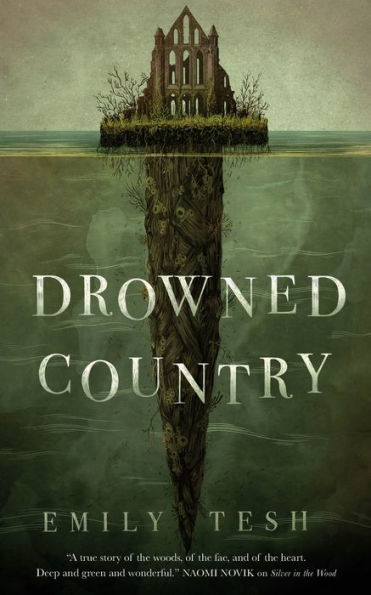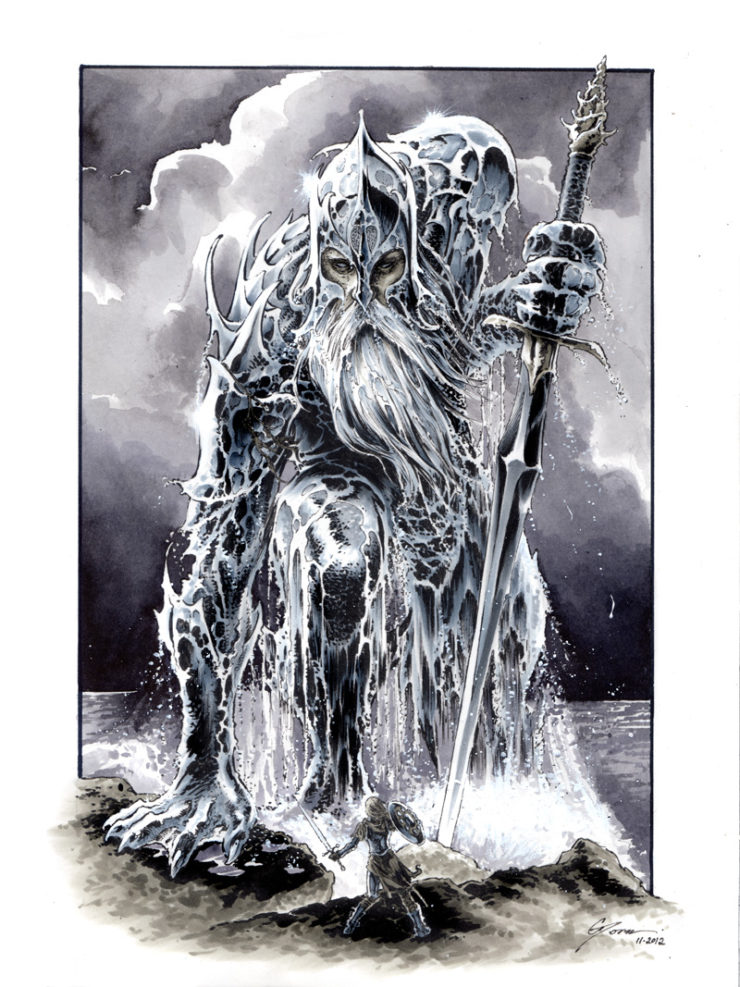In this biweekly series, we’re exploring the evolution of both major and minor figures in Tolkien’s legendarium, tracing the transformations of these characters through drafts and early manuscripts through to the finished work. This week’s installment is the first in a mini-series exploring the Vala Ulmo, Lord and Wielder of Waters, Dweller of the Deep, the Pourer: the god at whose prompting Gondolin was founded and through whose protection Eärendil made his renowned journey to the Undying Lands.
Despite playing little more than a supporting role in Middle-earth’s great dramas, Ulmo casts a long shadow—even for a god. Read through The Silmarillion and The History of Middle-earth and you’ll get the distinct impression that the Lord of Waters is a force to be reckoned with. And not because he’s constantly showing off his power; rather, it’s because he sees far more clearly than his peers and sets his pieces in motion before anyone else realizes there’s a game to be played.
In the early stories of Middle-earth, Ulmo is able to accomplish so much because he is fore-sighted, even more so than Manwë, according to one telling (The Book of Lost Tales 1, hereafter BLT1, 198). As Tolkien wrote and rewrote the origin stories of Arda, this characteristic fades into the background, especially once Mandos comes on the scene. However, it’s still an important facet of Ulmo’s ability to see the long game—and win.
Ulmo is less imposing in the earlier drafts, though. He very much fulfills the sort of traditional sea-god role in that he’s severely aloof, quick to anger, and impressively armored in scale-like plate and a belt of gigantic pearls, with blue-ish hair and a magic car pulled by glow-in-the-dark fish (BLT1 113; also check out (BLT2 156-157). Now, Ulmo’s appearance here is certainly impressive–but this Ulmo carries with him the vague hints of fairy tales, which, while by no means negative, is certainly a far cry from the powerful, stern god of the later stories.
This early Ulmo is also more closely connected with sea creatures than he becomes later. Besides the three phosphorescent fish who follow him constantly (BLT1 113), Ulmo is also attended at one point by a mystical whale named Uin, who helps move an island across the Great Sea (BLT1 127). Furthermore, Ulmo is cited here as the creator of the fishes and other fantastic water beasts. Feeling deeply the loneliness of the vast waters, Ulmo seeks out Yavanna, at that time a noted spell-weaver, for words that will allow him to people the waters with creatures of his own devising. She complies, and Ulmo creates all sorts of miraculous animals that join him in the depths (BLT1 113. He does not, the text is anxious to point out, create shellfish or oysters, which are a mystery even to the Valar, and may or may not have existed even before Melkor the Dark Lord came to invest the world with violence and disorder.
It’s important to pause and note here that at this point in Tolkien’s creative process, the Valar were far less powerful and virtuous than they later become. The part that the Valar (especially the nine great Aratar, at that point only four in number) play in Arda’s creation is particularly vague. While they’re certainly involved, it’s at a much less personal level; they aren’t required to do quite the same amount of work as they are in The Silmarillion, for example. So in this early stage, Ulmo’s creation of fishes is much more personal than his almost-metaphysical creation of Water as a concept. That’s why he has such an apparently personal relationship with them, and why, incidentally, Ulmo is so concerned when Melkor’s violence starts affecting the lives of his fish.
Buy the Book


Drowned Country
As Tolkien revised, he steps away from Ulmo’s connection to sea creatures and other water creatures, emphasizing instead Ulmo’s relationship with Water itself. The god delights in waters for their own sake, and because they are beautiful and make beautiful things. And with this transformation appears a fascination with the relationship between water and music.
It’s at this moment, I think, that the character of Ulmo begins to gain great depth. We find that Ulmo, fascinatingly, was “the Ainu whom Ilúvatar had instructed deeper than all the others in the depths of music” (BLT1 53). Such a statement has several particular implications we want to explore. The first is that with this statement, Tolkien gives us a credible origin point for Ulmo’s powers of foreknowing. Remember that in the “Ainulindalë,” the Music represents both the powers of creation and the fabric of history. The more one understands one’s own, and others’, part in the great theme, the more wisdom one gathers concerning the workings of the world and Ilúvatar’s plan for it. Ulmo is incredibly wise, and, as we’ve already mentioned, sees further than any of his kin. He is prepared. I like to think of him as a particular agent of Ilúvatar on earth: the One has taken him aside, given him a few pointers—instilling a sort of “I’m counting on you” bit of confidence that goes a long way towards making the world a better place.
Ulmo’s connection to music also explains his particular rivalry with Melkor. Melkor, or Morgoth, was first and foremost a bad musician. He is like the player in the orchestra who, becoming bored with his own part, begins to embellish it with thoughtless trills and cadenzas. Because he has ceased to listen to his part in the whole, he cannot see that next to it, his own part has become frivolous and even obnoxious (especially to those around him, who may begin to play badly themselves because they can no longer hear aright).
Ulmo is, of course, radically different. Ulmo is like the good concertmaster who is in tune and rhythm with the conductor. The good concertmaster may, and often does, have a special solo part to play, but it only embellishes and enhances the whole, rather than diminishing it. For this reason, Ulmo’s solo music, water, is utterly incomprehensible to Melkor. One passage in Morgoth’s Ring even points out that water is “almost entirely free of Morgoth” (401). Because water works in concert with the Music of Ilúvatar, it takes on a spiritual quality that makes it a particularly effective symbol of goodness and purity (and brings new significance to certain textual information, such as the fact that even the water of Mordor is defiled).
So the Lord of the Waters understands the Music. Music and Water working together in a pure relationship undefiled by Melkor makes each an important spiritual symbol in its own right, but we don’t have the time or space to go into that here—after all, Tolkien scholars have written books about it.
All the same, it’s important to recognize the fact: it makes Ulmo’s role in the story far more important because we can presume that he knows more of Ilúvatar’s full plan that at least most of the other Valar (and potentially more than all of them). We need that perspective before we launch into the full expanse of Ulmo’s righteous scheming.
I want to point out, too, that while Ulmo is water’s creator, and while he fashions it with love and reverence, he is neither possessive of it nor greedy of its development by others. An important passage in The Silmarillion explains this:
And Ilúvatar spoke to Ulmo, and said: Seest thou not how here in this little realm in the Deeps of Time Melkor hath made war upon thy province? He hath bethought him of bitter cold immoderate, and yet hath not destroyed the beauty of thy fountains, nor of thy clear pools. Behold the snow, and the cunning work of frost! Melkor hath devised heats and fire without restraint, and hath not dried up thy desire nor utterly quelled the music of the sea. Behold rather the height and glory of the clouds, and the everchanging mists; and listen to the fall of rain upon the Earth! And in these clouds thou art drawn nearer to Manwë, thy friend, whom thou lovest.” (8)
Ulmo responds joyously, exclaiming that “Water is become now fairer than my heart imagined” rather than being contorted to cross-purposes by Melkor. The Vala’s response is nothing short of miraculous. In this series, we have tracked the response of many characters to the use and abuse of their various creations. Even Aulë, I would venture to say, is not so gracious. Ulmo goes on to literally praise how Melkor’s attempted violence transformed his solo creation into things of surpassing beauty—into snowflakes and rain. He does not rail against Melkor’s evil, but rather finds the good that he can glory in.
I call the response miraculous because, as Tolkien repeatedly shows us, it’s incredibly hard to be so generous with the works of your hands. Even Tolkien himself, who wrote these words and who once said he wished to leave room in his legendarium for other imaginations to play, often balked at adaptations and transformations of his ideas, and instantly rose up in righteous anger against the pirated U.S. edition of The Lord of the Rings.
But Ulmo knows Ilúvatar’s plan better than anyone else, so he is gracious. He lets go. He finds the strength to set aside greed and power to rejoice in the fact that even transformed by the wiles of the Dark Lord, his creation is still bringing Ilúvatar glory. He closes his response to Ilúvatar by promising that he will seek out his brother Manwë and the two will, together, continue to reprise their original work.
If the rivers and streams are indeed the veins of the earth, it’s no wonder Ulmo has his finger on the pulse of Arda. We’ll see next time how his special connection with the Music, and his commitment to following Ilúvatar’s plan even when he must go against the decrees of the Valar, allow him to become one of the prime movers in Middle-earth’s tumultuous early history. We’ll follow Ulmo’s influence through the arrival of the Eldar in Middle-earth, through their journey to Valinor and the Exile of the Noldor, to the founding and later fall of the great city of Gondolin, and finally to the voyage of Eärendil and the final battle against the machinations of Morgoth and Sauron.
Megan N. Fontenot is a Tolkien scholar and fan who is thankful for the light and hope that can be found in Middle-earth, as well as the encouragement of the lezssons the characters embody. Catch her on Twitter @MeganNFontenot1 and feel free to request a favorite character while you’re there!










